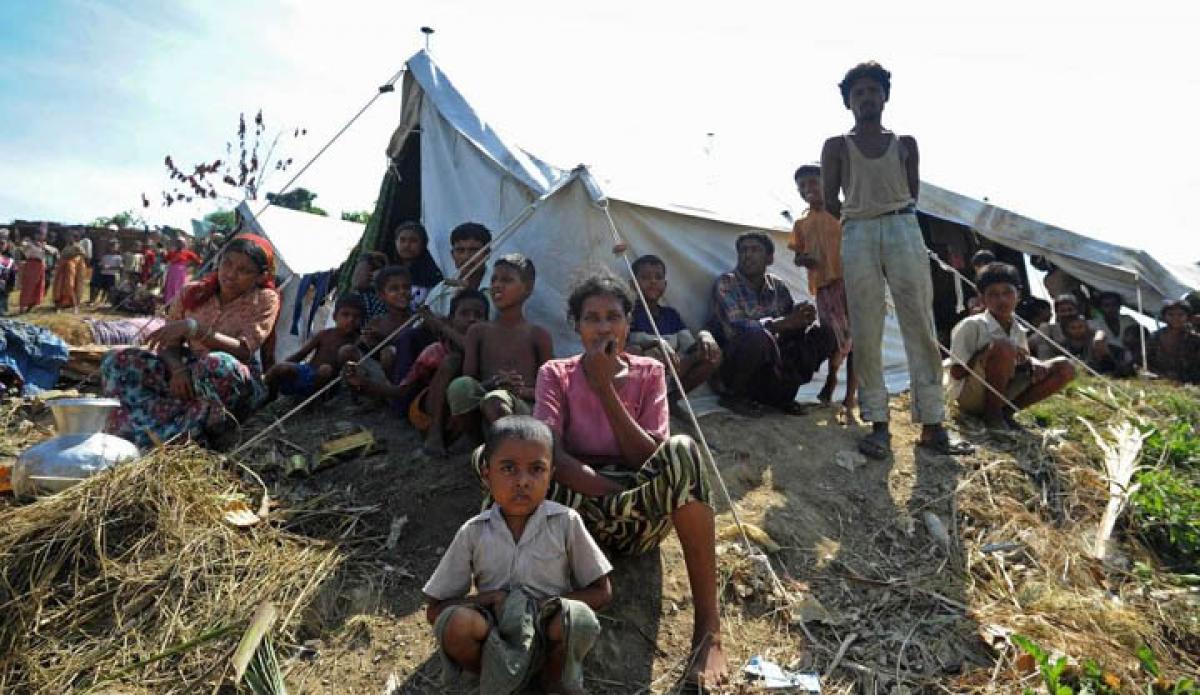Live
- Polling concludes in Maharashtra and Jharkhand Assembly elections
- Chhattisgarh CM Sai briefs HM Amit Shah on progress in Maoist-affected areas
- Bengal PDS case: ED seeks report on medical conditions of jailed former minister
- Siddharth's Romantic Drama Miss You Set to Hit Theaters on November 29
- India’s 1st AI data bank to boost national security launched
- Humbled to receive 'Key to the City of Georgetown', says PM Modi in Guyana
- 11 lakh BPL cards revoked, claims K’taka BJP
- Exit polls results indicated victory of the NDA government in Maharashtra and Jharkhand!
- Deputy CM Bhatti Vikramarka Reviews SC/ST Development Funds Implementation
- AP cabinet approves key decisions, check here
Just In

x
Highlights
Six-year-old Tasleema is nobody\'s \'laadli beti\' (beloved daughter). She has no idea of the horrors her parents have been through. Worse still, she has no future as she belongs to one of the nearly 650 families of Rohingya Muslim refugees from Myanmar living in this Jammu and Kashmir winter capital since 2008.
Six-year-old Tasleema is nobody's 'laadli beti' (beloved daughter). She has no idea of the horrors her parents have been through. Worse still, she has no future as she belongs to one of the nearly 650 families of Rohingya Muslim refugees from Myanmar living in this Jammu and Kashmir winter capital since 2008.
.jpg)
Molvi Yunus, 39, is a Rohingya Muslim refugee living with his family in Jammu's Narwal area where a stinking slum sans any civic facilities has come up. The 'jhuggies' (structures made of bamboo sticks wrapped on the sides and the top by a polythene cover) are what these refugee families call their homes.
Around 6,000 Rohingya Muslim refugees live at different places in Jammu city.
There is no drinking water, no electricity, no toilets and no healthcare facilities for them and yet the refugees thank God because they believe their lives are 'safe'.
"I crossed into Bangladesh from Burma (Myanmar) when persecution of Muslims became unbearable. From Calcutta I shifted with my family to Delhi where I begged for food to keep myself and my family alive," Yunus told IANS as he narrated his story.
"It was in Delhi that I met a Kashmiri who told me J&K was a state in India where Muslims lived in majority. I came here in 2008. Buddhists and Muslims fought together for Burma's independence. Just two years after 1948, one of our senior community leaders, Abdul Razak was murdered, under a conspiracy.
"Thereafter, the process of Muslim persecution started in Burma. In 1972 our religious rights were usurped. No Muslim could build a new mosque nor could an old mosque be repaired.
"Taxes were imposed on Muslims. For burying a Muslim we had to pay a huge tax to the government. Muslims had to give one-fourth of their agricultural produce to the government without any compensation," Yunus claimed.
"My relatives who ran out of Burma to India after 2012 told me that a group of Muslim preachers had come to our native Moungdow district in 2012. On their way back from Moungdow where they had held religious congregations, all the nine preachers were kidnapped and brutally murdered", Yunus said.
When voices were raised against Muslim persecution, the government authorities, he alleged, gave weapons and army uniforms to members of the other community who went on a rampage to kill Muslim men, women and children.
Ali Ahmed, 66, is another Rohingya refugee living in Narwal. He says after settling as refugees in Jammu, the community has no future except that their lives are safe.
"Yes, we will not be killed here, but we can always die of hunger. We cannot get government employment. Our children were not admitted in any government school till two years back. Now, we are allowed to send our children to a government school", Ali Ahmed said.
The youths of the community like Usman Gani, 22, Mehmood-ul-Haq, 25, and others work as scrap gatherers, starting their day before sunrise.
"We collect scrap and sell it to scrap dealers in the city. We also do jobs like laying underground cables for the telecommunication companies or laying of railway tracks. But that is not earning a living. We are just surviving", said Usman Gani.
Yunus said he has called on almost every minister and senior bureaucrat in the previous and the present government to narrate the problems of his community.
"They say 'kareingay' (Will do), but nobody does anything for us," he said.
As the elders of her refugee community narrated their heart-rending stories to IANS, Tasleema looked on with hope. A faint, half-smile on her face shows she thinks somebody has come to address her problems and assure her a better future.
The girl has no idea that hers is going to be another 'human interest' story for the readers. Nobody can assure her a better tomorrow, for all members of this refugee community are living 'illegally' in Jammu and Kashmir.

Next Story
More Stories
ADVERTISEMENT
© 2024 Hyderabad Media House Limited/The Hans India. All rights reserved. Powered by hocalwire.com







